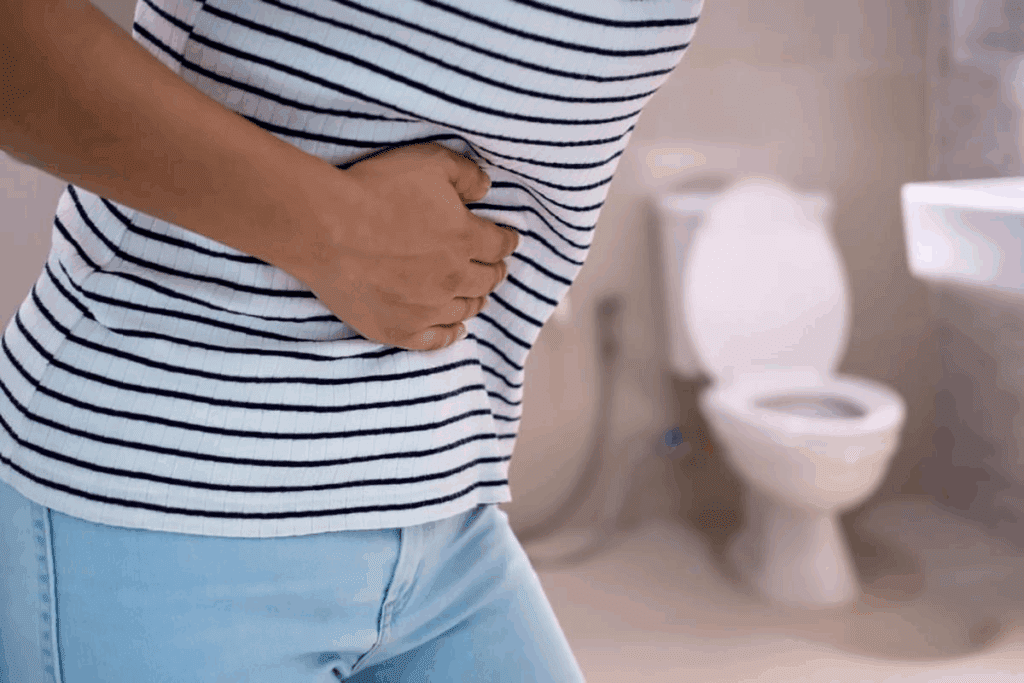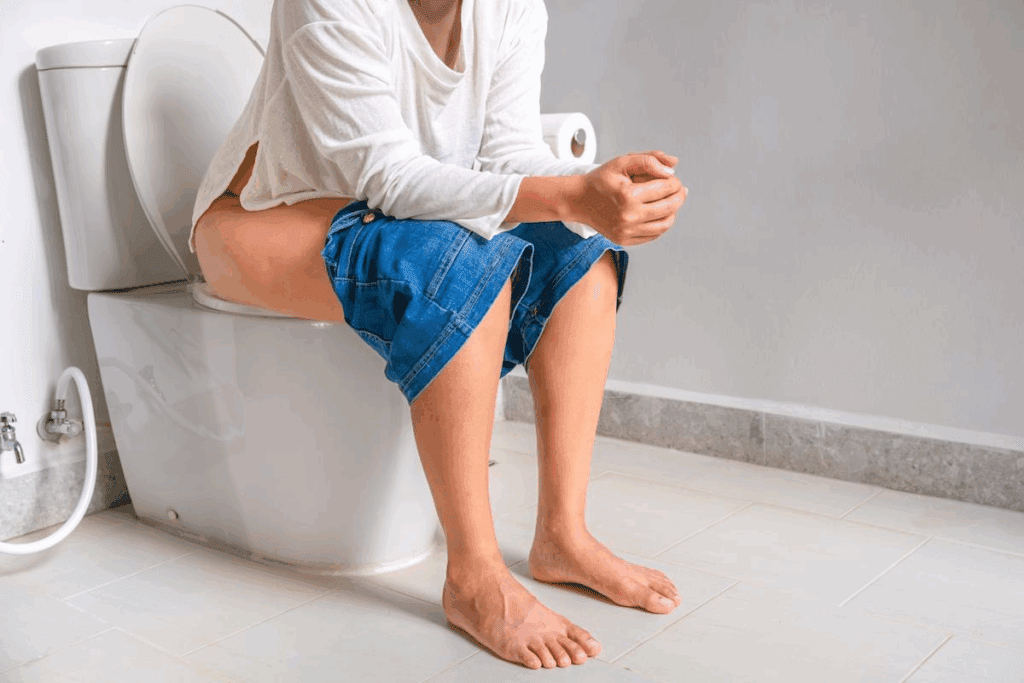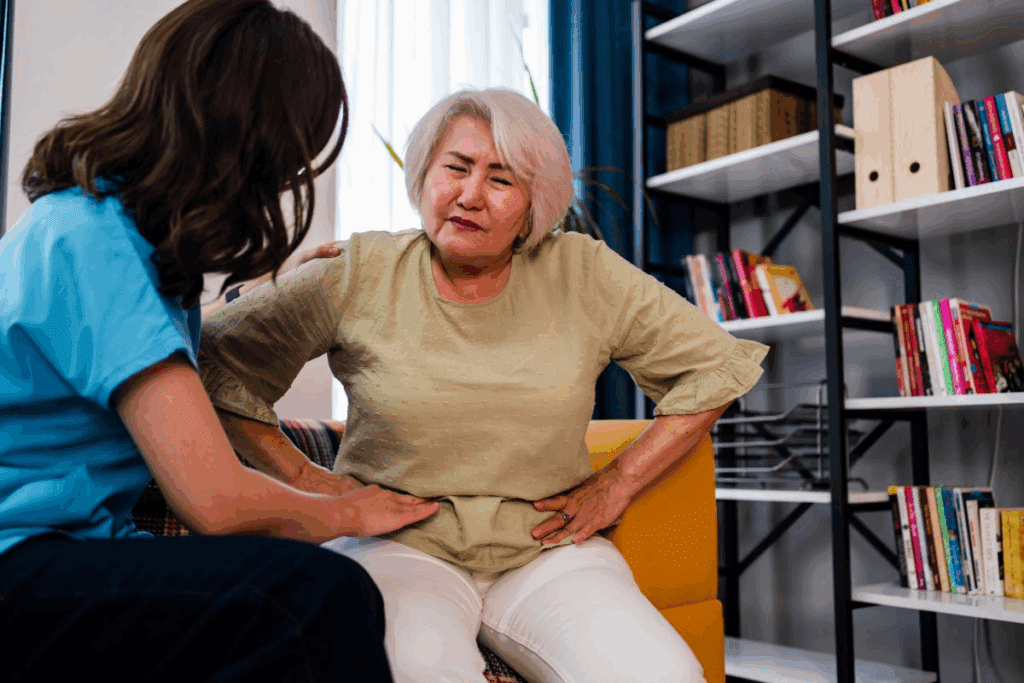Last Updated on November 26, 2025 by Bilal Hasdemir

Gallbladder issues can cause persistent diarrhea and changes in stool. It’s important to know the symptoms of gallbladder disease early. This helps in getting the right treatment on time.
At LivHospital, we focus on our patients’ needs. Many patients ask, will a bad gallbladder cause diarrhea, and we help them understand how gallbladder symptoms affect their digestive health. Our team is ready to offer top-notch healthcare and support.

To grasp how gallbladder issues can lead to diarrhea, we must first know what the gallbladder does. It’s a small organ that holds bile. Bile is a fluid made by the liver, key for digestion.
The gallbladder is shaped like a pear and sits under the liver. It’s a vital part of our digestive system. It helps break down fats, even though it’s small.
The gallbladder helps digestion by storing bile. When we eat fatty foods, it releases bile into the small intestine. This makes fats easier for our body to absorb.
Bile is essential for fat digestion. Without enough bile, fats aren’t broken down right. This can cause diarrhea as the body tries to get rid of undigested fats.
In short, the gallbladder is key for fat digestion. It stores and releases bile as needed. This ensures fats are digested well, keeping our digestive system healthy.

The gallbladder is key to our digestive system. Its problems can cause many stomach issues. Knowing this helps us spot and handle gallbladder symptoms.
Gallbladder issues can really mess with digestion. If the gallbladder doesn’t work right, it can’t make or release enough bile. This makes it hard to digest fats, leading to diarrhea, bloating, and stomach pain.
Key effects of gallbladder dysfunction on digestion include:
Many conditions can trouble the gallbladder, causing stomach problems. Here are some common ones:
These issues can cause symptoms like diarrhea, stomach pain, and changes in stool color. This shows how important the gallbladder is for good digestion.
Research shows that people with gallbladder problems often get diarrhea. The gallbladder helps break down fats. When it doesn’t work right, it can cause many digestive problems.
Studies have found a strong link between gallbladder disease and diarrhea. Many patients with gallbladder disease say they have diarrhea. This shows that gallbladder problems can cause stomach issues like diarrhea.
Gallbladder problems can cause loose stools because of its role in bile storage. Bile helps digest fats and absorb vitamins. If the gallbladder doesn’t work right, it can upset the balance of bile salts.
This imbalance can irritate the colon, making it move too fast and leading to loose stools. Bile salts help absorb water and electrolytes in the colon. Without the right balance, this process is disrupted, causing diarrhea.
Diarrhea is common in people with gallbladder disease. Studies show many of these patients have diarrhea. This can be because of their gallbladder problem or surgery like cholecystectomy.
How often someone gets diarrhea can vary. But, it’s clear that gallbladder problems often lead to diarrhea.
People with gallbladder problems often get diarrhea after eating fatty foods. This happens because the gallbladder helps digest fats. If it doesn’t work right, it can cause stomach problems.
The gallbladder holds bile, a key fluid for fat digestion. When we eat fatty foods, the gallbladder releases bile to break down fats. But if it’s inflamed or not working, it can’t release enough bile. This leads to poor digestion and diarrhea.
Also, if the gallbladder releases bile too fast or not enough, it can upset digestion. This imbalance can irritate the intestines and cause diarrhea, mainly after eating fatty foods.
The timing and how long diarrhea lasts can vary. It usually starts a few hours after eating fatty foods. It can last from a few hours to days, depending on the gallbladder problem and the food.
Some people may have diarrhea that keeps coming back for a long time. This can lead to dehydration and nutrient loss if not managed well.
Diarrhea after eating fatty foods can be a sign of gallbladder problems. But it’s important to tell it apart from other digestive issues. Conditions like IBS, celiac disease, and pancreatitis can also cause diarrhea and stomach pain.
A doctor can figure out the cause by looking at your medical history, doing a physical exam, and running tests like ultrasound or endoscopy. Knowing the cause is key to finding the right treatment.
The gallbladder is key in digestion. Issues with it can cause noticeable changes in stool. When the gallbladder doesn’t work right, it affects digestion, mainly fat handling. This leads to changes in stool.
Pale or clay-colored stools can mean bile duct blockage or less bile. Bile gives stool its brown color. Without enough bile, stools look pale or clay-like. This can also cause jaundice and other symptoms.
Greasy or floating stools hint at gallbladder problems. A bad gallbladder means less bile salts in the intestine. This makes fats not digest well, causing greasy or floating stools. Undigested fats are less dense than water.
Stool color and consistency changes tell us about bile flow and gallbladder health. For example:
These symptoms need medical check-up. They might show gallbladder disease or other digestive problems needing treatment.
Gallbladder disease can cause many symptoms, like abdominal pain and cramping. These symptoms can tell us about gallbladder problems. They might show what’s happening with a person’s health.
Pain from gallbladder issues usually happens in the upper right or middle abdomen. It can feel sharp and intense or just a dull ache. Sometimes, it spreads to the back or right shoulder, making it hard to find a comfortable spot.
Some people feel intermittent pain, while others have persistent discomfort. The type of pain can hint at the gallbladder problem.
People with gallbladder disease often notice their pain is linked to bowel movements. For example, eating fatty foods can make the pain worse. This is because fatty foods can make the gallbladder contract, which can hurt if it’s inflamed or blocked.
Changes in bowel movements, like diarrhea, can also bring on abdominal cramping. This cramping happens because the body tries to move food through the digestive system faster.
| Pain Characteristic | Possible Cause |
| Sharp, intense pain | Gallstones or gallbladder inflammation |
| Dull ache | Chronic gallbladder disease |
| Pain after fatty meals | Gallbladder dysfunction or bile duct obstruction |
Abdominal pain and cramping can be uncomfortable but sometimes mean a serious issue. For example, severe and ongoing pain could be a sign of a gallbladder attack or cholecystitis. These need quick medical help.
If you have severe pain that doesn’t go away, a fever with the pain, or jaundice, get medical help right away.
The gallbladder is key in digestion. When it doesn’t work right, you might feel sudden and urgent need to go. This can really mess up your day-to-day life. We’ll look into why this happens, how it affects you, and ways to handle it.
Gallbladder problems can mess up bile flow. “When the gallbladder doesn’t work, bile release is off,” says a gastro expert. This can cause diarrhea or loose stools because the body can’t digest fats well.
Feeling urgent to go can really mess with your plans. You might not want to go out or travel because of the discomfort. It can make you feel anxious and lonely, making life harder.
One person said, “I avoid going out because I’m scared of having an accident.” This shows we need good ways to deal with these issues.
Handling sudden urgency needs diet changes, lifestyle tweaks, and sometimes meds. Keeping a food diary can show what foods make symptoms worse. Avoiding fatty foods might help.
In some cases, you might need medical help for gallbladder issues. Talking to a doctor is key to finding the right solution.
Bloating and excessive gas can really mess with your day. They’re even worse when you have diarrhea too. Gallbladder problems can make these symptoms even more uncomfortable.
Gallbladder problems can mess up how bile is released. This affects how fats are digested and can lead to more bacteria in the small intestine. This bacterial growth can cause more gas, leading to bloating and discomfort.
When the gallbladder doesn’t work right, digestion gets messed up. Bile, which helps break down fats, might not be released properly. This can cause undigested fats to be fermented by bacteria in the colon, leading to gas and bloating.
Bloating can be caused by many things, like what you eat or other stomach problems. But gallbladder-related bloating has its own signs. Knowing these differences is key to figuring out what’s wrong and how to fix it.
Gallbladder-related bloating often comes with diarrhea, and it happens after eating fatty foods. It doesn’t get better with usual treatments like antacids or gas meds. Spotting these patterns can help find the real cause of bloating.
Dealing with bloating from gallbladder problems needs a few different steps. This includes changing what you eat, your lifestyle, and sometimes, medical help. We’ll look at ways to ease bloating and make digestion better.
Understanding why you get bloating and gas from gallbladder problems and using the right strategies can make a big difference. It’s important to talk to a doctor to create a plan that works just for you.
Nausea and vomiting with diarrhea can mean gallbladder problems. It’s key to know how these symptoms relate to gallbladder issues and emergencies.
Nausea and vomiting are more than just stomach issues. They can be signs of gallbladder problems. The gallbladder helps digest food by releasing bile into the small intestine. If it doesn’t work right, it can cause nausea and vomiting, often after eating fatty foods.
Bile duct obstruction or gallstones can make these symptoms worse. They block bile flow even more.
Sometimes, nausea and vomiting mean a gallbladder emergency. This could be cholecystitis (inflammation) or a gallstone blocking the bile duct. If you have severe pain, fever, or jaundice with nausea, get medical help right away.
These signs together mean you need quick medical help.
To manage nausea from gallbladder problems, try changing your diet and taking medication. Avoid fatty foods and eat smaller meals more often. Anti-nausea meds might help, but talk to a doctor first.
If nausea and vomiting are bad and don’t go away, see a doctor. They might suggest surgery to remove the gallbladder.
Gallbladder disease often gets worse over time, causing ongoing discomfort. It’s important to know what makes this happen.
Gallbladder disease gets worse if not treated. It starts with small problems but can turn into serious issues like chronic cholecystitis or pancreatitis. This can really hurt your quality of life.
Key factors contributing to the progression of gallbladder disease include:
Ignoring gallbladder issues can lead to serious problems. These can harm your digestive health and overall well-being. Some possible complications include:
| Complication | Description |
| Chronic Cholecystitis | Persistent inflammation of the gallbladder, leading to chronic pain and digestive issues. |
| Gallstone Pancreatitis | A condition where gallstones block the pancreatic duct, causing pancreatitis. |
| Bile Duct Damage | Prolonged blockage of bile ducts can lead to damage and scarring, affecting bile flow. |
A study in the Journal of Clinical Gastroenterology found that untreated gallbladder disease can cause serious problems. This shows why early diagnosis and treatment are so important.
“The presence of gallstones is a major risk factor for gallbladder cancer, and chronic inflammation is believed to play a key role in the carcinogenesis of gallbladder cancer.”
Keeping track of symptoms is key to managing gallbladder disease. By watching how symptoms change, patients and doctors can spot signs of worsening disease. This helps make treatment plans better and prevents severe problems.
Effective symptom tracking involves:
Understanding how gallbladder disease gets worse, knowing the risks of long-term problems, and tracking symptoms can help patients manage their condition. This improves their quality of life.
Knowing when to seek medical help is key to avoiding serious problems with the gallbladder. Gallbladder issues can show up in many ways, like changes in bowel movements, stomach pain, and other digestive problems. It’s important to know when these symptoms mean you need to see a doctor right away.
Some symptoms are urgent and need immediate medical attention. These include:
If you have any of these symptoms, it’s important to get medical help right away. This can help with gallbladder problems.
Doctors use physical exams, medical history, and tests to find gallbladder problems. Common tests are:
| Diagnostic Test | Purpose |
| Ultrasound | To see gallstones, inflammation, or other gallbladder issues |
| Endoscopic Ultrasound (EUS) | To get detailed images of the gallbladder and bile ducts |
| Hepatobiliary Iminodiacetic Acid (HIDA) Scan | To check how well the gallbladder and bile ducts work |
| Blood Tests | To look for signs of infection, inflammation, or liver damage |
These tests help doctors find the cause of gallbladder symptoms. They guide the right treatment.
Treatment for diarrhea caused by the gallbladder aims to fix the root cause. This might include:
We work with doctors to create a treatment plan. It aims to solve the cause of gallbladder-related diarrhea and improve digestion.
Managing gallbladder-related digestive symptoms needs a full approach. We’ve talked about how gallbladder issues can lead to diarrhea and changes in stool. It’s key to know these symptoms.
Gallbladder poop symptoms might show an underlying problem. Knowing if a bad gallbladder can cause diarrhea is vital for the right diagnosis and treatment. Studies show gallbladder problems can cause diarrhea because it’s important for fat digestion.
If you’re facing ongoing or severe symptoms, getting medical help is a must. At LivHospital, we offer detailed care for international patients, including those with gallbladder issues. Understanding the link between gallbladder problems and digestive health helps manage symptoms and boost overall health.
Can gall bladder problems cause diarrhea? Yes, they can. Being aware of symptoms and getting medical care can greatly improve treatment results.
Yes, a bad gallbladder can cause diarrhea. Problems like gallstones or cholecystitis can lead to loose stools.
Yes, gallbladder issues can change stool color and consistency. You might see pale or clay-colored stools and greasy stools.
Fatty foods can cause diarrhea in those with gallbladder issues. The gallbladder helps digest fats by releasing bile into the small intestine.
Symptoms include abdominal pain and cramping, bloating, and excessive gas. You might also feel nauseous, vomit, and see changes in stool color and consistency.
Gallbladder problems can disrupt digestion, leading to more gas in the intestines. This causes bloating and gas.
Seek medical help if you have persistent or severe diarrhea, abdominal pain, or other digestive issues. These can be signs of a serious problem.
Tests include imaging like ultrasound, CT scans, or MRI, and blood tests for infection or inflammation signs.
Yes, gallbladder problems can be treated. Options include surgery, medications, or lifestyle changes to manage symptoms.
Manage diarrhea by avoiding fatty foods, staying hydrated, and using medications if needed.
Yes, diarrhea is common in gallbladder disease. Many patients with gallbladder disease experience it.
Removing the gallbladder might help with diarrhea, but it’s not a sure thing. Results can vary from person to person.
Ljubičić, N., et al. (2015). Biliary leakage after urgent cholecystectomy. Journal of Hepato-Biliary-Pancreatic Sciences. Retrieved from https://pmc.ncbi.nlm.nih.gov/articles/PMC4436923
Subscribe to our e-newsletter to stay informed about the latest innovations in the world of health and exclusive offers!